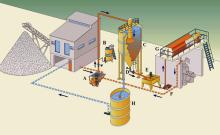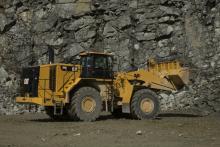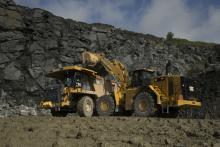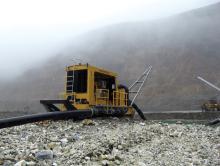In the UK (and more specifically in England and Wales) mineral operators face a new regulatory challenge requiring them to obtain permits to dewater quarries, as the UK government finally withdraws their licence exemption. Planning expert, Chris Tofts from
Although the UK government has said the change will help the UK meet its general obligations under the Water Framework Directive to achieve “good” water body status, this reform is seen by some as a classic example of the UK’s alleged tendency to “gold plate” environmental regulations to the detriment of local industry.
In 2000, the EU Water Framework Directive (WFD) was adopted. This included a requirement that member states introduce measures to control the abstraction of water to protect, enhance and restore all bodies of groundwater, and ensure a balance between abstraction and recharge of groundwater, with the aim of achieving good groundwater status by 2015 at the latest.
Legislation requiring operators to secure abstraction licences has been on the statute books for over a decade, but had not been brought into force.
The publication of the government’s consultation response on changes to water abstraction licensing exemptions confirms that the changes will finally be going ahead, notwithstanding the representations of the mineral industry.
Transitional period
A transitional period will apply, such that operators may continue to abstract water: until their application is determined; or if no application is made, until 31 December 2019.
It is expected that the regulator will determine all applications within three years from the end of the two year application period.
New licences
It is estimated that 4,000 new licences will need to be granted and that the majority of these will be for the transfer of water.
It is expected that these licences will maintain existing rights and entitlements where possible.
As a result of the consultation responses the government has changed its position and confirmed that the regulator will have flexibility on the inclusion of volume conditions on a transfer licence.
The consultation states that where the current abstraction is unmeasured, and there are satisfactory alternative ways to control the abstraction, the government expects the regulator to use a licensing approach that minimises regulatory burdens on the abstractor.
Operators will be expected to provide sufficient evidence of historic abstraction to support the making of a valid application. Evidence could include meter readings, pump ratings, calculations of abstracted quantities, invoices for equipment, photographs of infrastructure, or business receipts/contracts. If they have not already done so, operators are advised to start securing this evidence in preparation for the licence application.
Guidance will be provided on the evidence requirements. This should take account of the variability of abstractor working practices, including situations where abstraction volumes are not measured.
Other exemptions?
The consultation response confirms that a licence is not required for the dewatering of “wholly or mainly rainwater” from an excavation.
There remains an exemption from the requirement to obtain a licence if the abstraction is less than 20m3/day per source of supply.
Proposed amendments to water legislation will allow emergency abstraction of water if, in the opinion of the abstractor, it is necessary to abstract water to prevent immediate danger of interference with any mining or quarrying operations or, in relation to such operations, to prevent an immediate risk: (a) to a human being of death, personal injury or harm to health; (b) of serious damage to works resulting from any such operations; or (c) of serious damage to the environment. If this is utilised, a notice procedure must be complied with.
New quarries and extensions
New planned minerals development (including extensions) will not benefit from the transitional provisions and so will require an application for a licence.
It is expected that operators may apply for a licence for new planned abstraction together with the previously exempt activities.
Compensation provisions
Compensation may be applied for where loss or damage arises from a refused or constrained application for lawful abstraction that is made within the qualifying period.
However, there are a number of exemptions which will have to be considered on a case-by-case basis.
Regulatory impact
The government’s regulatory impact statement suggests:
i)Compliance and administration costs for licensing are up to £5.1m and loss of output up to £86.5m;
ii)that this will affect around 0.7% of 790 quarries.
Given that the text of the WFD explicitly permits exemptions, it would seem the government has missed an opportunity to apply a proportionate response to this area of water-abstraction legislation.








